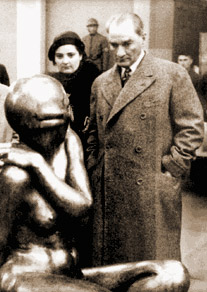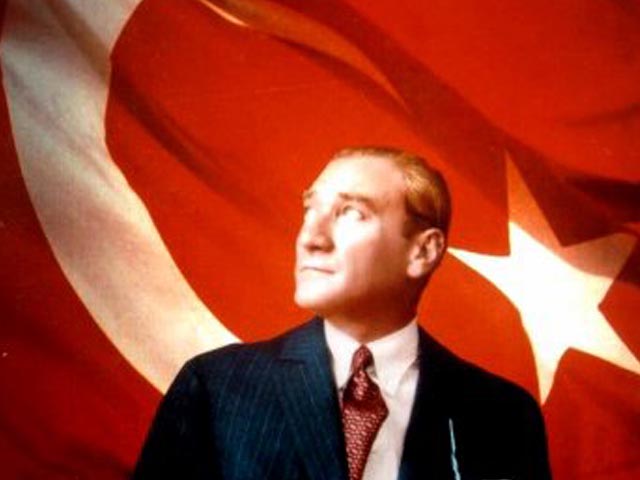This month the Turkish nation commemorates the 73rd anniversary of Ataturk’s passing. On this solemn occasion, rather than lamenting his loss, it is more fitting to take stock candidly of how true we have been to the legacy of this great leader.

Ataturk, now more than a mortal, is an ideal that permeates past, present and the future in many ways. He has grown in stature and impact with the passage of time. Always fresh, he transcended centuries. Ataturk’s emergence was not accidental created by the circumstances of one-time event like a spark; rather, it is Providential, a heightening of Divine intervention. His accomplishments are the great Turkish epic. Long before his fateful odyssey, Ataturk was obsessed with the sacred mission of liberating the country from the backward regime of the sultans. This idea germinated in his mind very early, and became his lifetime calling. His keen vision and selfless devotion resonated with his people, and penetrated their heart and soul; he was consumed with a burning desire to free the downtrodden nation from humiliation and the tyranny of a corrupt dynasty.
Ataturk emerged as a leader, anointed and inspiring savior when the country was beaten and exhausted. He believed in the unspoiled core of the Turkish character. He infused his nation with hope, self-reliance and dignity. He embraced the democratic ideal, and made it an integral part of the Turkish heritage. He was an ultimate statesman, a great teacher and a devoted founding father.
Ataturk was a warrior, yet a noble peace-maker, he appreciated the merits of peace, and steered his nation in that course. He revolutionized the value system of the Turkish people. The national pride and the freedom were notions unheard of up until then. The nation was true and staunch to him to the end, and resolutely rallied behind him and never failed him. His epic journey in military field followed his awesome accomplishments in social engineering, and came to a crescendo in a monumental success, the Republic. His transcending accomplishments placed him in the galaxy of the immortals that the future generations will look upon with inspiration.
Ataturk’s world view was Darwinesque. He believed that the survival of a nation depended on its adaptation to rationalism. For centuries, exposure to religious dogmas and superstitions had rendered the nation pessimist and fatalistic. The people were deprived of a national identity; they defined themselves as “ummah”. His goal was to transform the backward society into a modern, vibrant and secular nation. He was a Renaissance man, and created a cultural Renaissance during his relatively short tenure.
Ataturk was aware that his reforms, he so skillfully instituted could not have been assimilated within his lifetime; therefore, he trusted their safekeeping in the hands of the future generations. In his famous speech to the Turkish Youth he charged them with the guardianship of the Republic and furtherance of his reforms.
In this mission the Youth have a moral obligation to history, to the Turkish nation, and to themselves. Ataturk relied on a forward-looking, rational thinking and a progressive Youth with new and fresh ideas coming from fresh minds. He believed his reforms could flourish only in a climate of freedom under a Republican regime. A theocratic, backward society was not a healthy medium for his reforms to thrive.
Yet, at times Ataturk’s reforms were taken for granted and not pursued diligently, or even compromised by the successive administrations. In those circumstances, sadly, the Youth has been “Missing in Action” with a blunt insensitivity. In default of ideological guidance, the Youth at times seemed to have lost its bearings, and pursued wayward ideas and alien ideologies, like Mao’ism, Lenin’ism, or Khomeinism. Then, the question comes to mind, is the Youth inflicted with lethargy, or lost its compass? Or, feels challenged to identify with the spirit and the purpose of the reforms, because they were simply handed down by Ataturk in a silver tray?
Other phenomena that may have estranged the Youth from the Ataturk’s reforms are a frail democracy, inept politicians, and a corrupt political culture. The political Islam shrewdly exploits this “uncertainty” as a departure from the Qur’anic injunctions, and then it moves in to fill the vacuum. Even though the Turkish people were fully behind the Independence War against the invading enemies, the action against the corrupt and cowardly sultan was not a popular movement. Unlike the French and Russian revolutions, it was conceived, led and won by one man, Ataturk! The persistent and insidious propaganda generated in the mosques condemn the reforms, and spreads the word that the Turks had never sought the reforms which were imposed on them from above by Ataturk!
Borrowing words from Betty Kelly of the Ataturk Society of America, the Turkish Youth must come of age, redefine themselves and become a civil power. They must stop being a spectator on the sideline in the evolution of the society. No doubt, they do not want to live in a backward, theocratic, autocratic country with continued technological and economic dependence on the advanced nations. It is unimaginable that they would ever want to go back when they have plenty of reasons and adequate foundation to go forward. They have to pick up the banner passed on to them by Ataturk and run into the future before the banner collects more dust.
Ayhan Ozer
Pennington, NJ
November 2011

